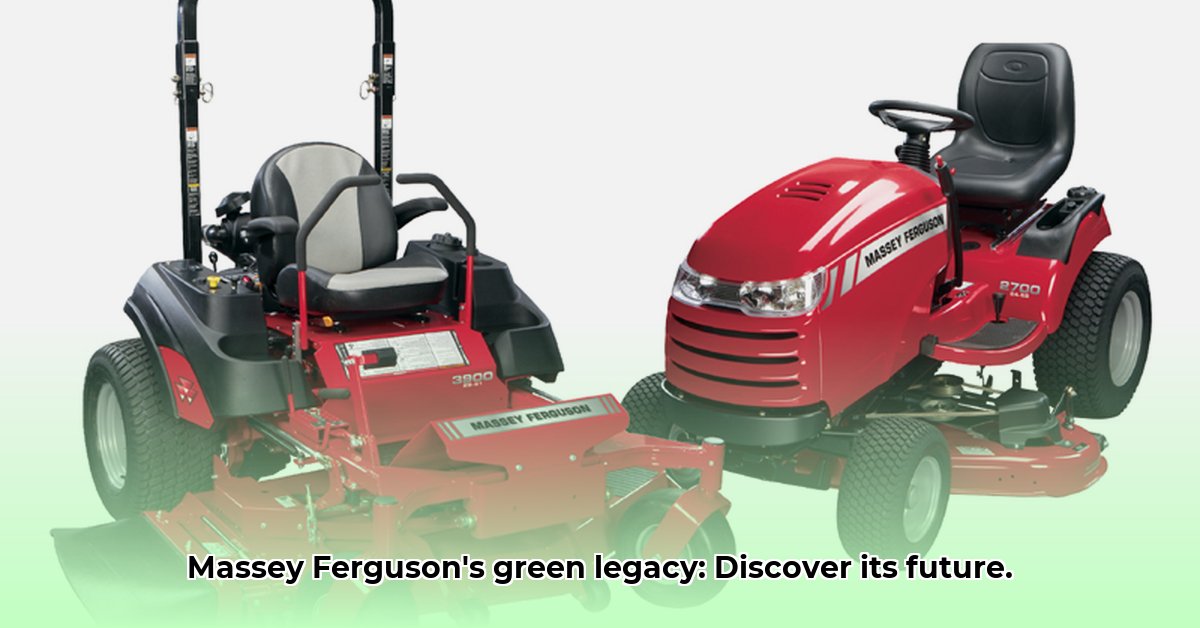
Massey Ferguson's Unexpected Journey: From Farm to Lawn and Back Again
For nearly two centuries, Massey Ferguson has been a titan in the agricultural world, its iconic triple triangle logo synonymous with powerful and dependable farm machinery. But the story of Massey Ferguson extends beyond the vast fields; it includes a fascinating, albeit shorter, chapter in the world of lawn tractors. This narrative explores the rise and fall of Massey Ferguson's lawn tractor line, offering insights into the strategic decisions that shaped its trajectory and the company’s current commitment to a sustainable future. Did the discontinuation of their lawn tractors in 2017 signal a strategic retreat or a necessary pivot towards a more sustainable future? The answer lies in understanding the evolving landscape of agricultural technology and Massey Ferguson's proactive response. For more on their compact tractors, see this page.
From Field to Backyard: A Legacy of Engineering Excellence
Massey Ferguson's foray into lawn tractors was a natural extension of its core competencies. The company leveraged its renowned engineering expertise, creating robust and reliable machines designed to withstand the rigors of home use. These machines, built with the same durability and craftsmanship as their larger counterparts, quickly gained popularity amongst homeowners. This small but significant product line showcased Massey Ferguson's adaptability and its ability to transfer its engineering prowess to a new market segment. But what factors contributed to the seemingly abrupt end of this era?
The 2017 Discontinuation: A Strategic Shift or Market Failure?
The 2017 discontinuation of Massey Ferguson's lawn tractor line remains a point of discussion. Was it a market-driven decision due to declining sales, increased competition, or rising production costs? Or was it a strategic move to refocus resources on core agricultural equipment where Massey Ferguson held undisputed dominance? The reality is likely a complex interplay of these factors. The increased focus on sustainability within the larger agricultural sector, and the significant investments required to meet increasingly stringent environmental regulations, undoubtedly played a role. The decision, however, highlights the dynamic nature of the market and the constant need for adaptation, even for established industry leaders. What were the long-term effects of this decision on the company's overall market standing?
A Greener Future: Massey Ferguson's Commitment to Sustainability
The agricultural industry is at a critical juncture. The world demands sustainable food production practices, driving a fundamental shift in how food is grown and supplied. This transformation presents both immense challenges and unprecedented opportunities for companies like Massey Ferguson. AGCO, the parent company of Massey Ferguson, has publicly emphasized its commitment to sustainability. But mere commitment is insufficient; tangible actions are required to demonstrate this dedication. This includes substantial investments in research and development, especially in eco-friendly technologies and sustainable farming techniques. How will Massey Ferguson continue to innovate while addressing the concerns of a sustainability-focused world?
A Roadmap for Sustainable Success: Actionable Steps
Massey Ferguson's transition to a more sustainable business model requires a comprehensive, multi-pronged approach comprising short-term and long-term initiatives. The following steps are crucial for navigating this transition:
Immediate Actions (0-1 year): Enhanced transparency through detailed sustainability reports, outlining progress and future plans. Accelerated R&D investments in electric tractors and precision farming technologies. Expansion of farmer training programs focusing on sustainable agricultural techniques.
Long-Term Vision (3-5 years): Comprehensive lifecycle assessments (LCA) for all products. Implementation of a circular economy model, encompassing repair, reuse, and recycling. Establishment of strategic partnerships with organizations specializing in sustainable technologies. Developing accessible financing options for sustainable farming technologies.
Navigating the Risks: A Proactive Approach
The transition to a more sustainable business model presents inherent risks. A proactive approach to mitigating these challenges is essential. Key risk factors include: market acceptance for electric tractors, complexities in integrating precision farming technology, sourcing sustainable materials, and successful implementation of a circular economy strategy. Effective mitigation strategies involve phased rollouts, strong partnerships, robust testing, and transparent communication.
Pivotal Points:
- Massey Ferguson's history demonstrates adaptability, but the lawn tractor discontinuation highlights the need for constant strategic adjustments.
- The company's commitment to sustainability is critical for its long-term success in a changing market.
- A multi-pronged approach is essential which includes short-term actions and a long-term vision, including substantial investment in R&D.
The Enduring Legacy: A Sustainable Future for Massey Ferguson
The discontinuation of Massey Ferguson's lawn tractor line serves as a valuable lesson. Even industry giants must embrace change and adapt to evolving market dynamics and consumer expectations. The company's future hinges on its ability to fully embrace sustainability – not just in words, but through decisive action. This commitment will determine whether Massey Ferguson will continue to thrive as a leader in agricultural technology, shaping the planet’s future through innovation and responsible practices.